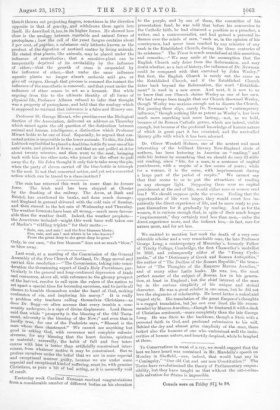We omitted to mention last week the death of a
very con- siderable scholar and a very remarkable man, the late Professor George Long, a contemporary of Macaulay's, formerly Fellow of Trinity College, Cambridge, the first Chancellor's medallist in 1822, and subsequently editor of the " Penny Cyclo- pedia," of the " Dictionary of Greek and Roman Antiquities," the author of " The Decline of the Roman Republic," the trans- lator of " The Thoughts of the Emperor Marcus Aurelius," and of many other Latin books. He was, too, the most perfect master of the subject of Roman law iu his genera- tion, at least in England ; but the chief interest of the man lay in the curious simplicity of his unique and stoical character. He was a great scholar in one sense, but he did not love the elegaucies of scholarship. He loved better a naked and rugged style. His translation of the great Emperor's thoughts is a rugged translation, but :no one ever lived. the life recom- mended by Marcus Aurelius,—though he tiuetured it with a dash of Christian sentiment,—more completely than the late George Long. He was Stoic to the backbone, though a Stoic with a personal faith in God, and profound. submission to his will. Behind the dry and almost grim simplicity of the man, there lurked also the humour of one who understood well the insin- cerities of human nature, and heartily despised, while he laughed at them.






























 Previous page
Previous page